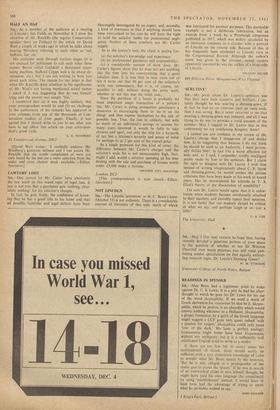SIR,—My point about Dr. Leavis's seminars was that they were
both eccentric and brilliant. I cer- tainly thought he was wearing a dressing-gown. If in fact he had on an overcoat over an open neck, then I was wrung. But it never occurred to me that wearing a dressing-gown was indecent, and all I was trying to do was to provide a vivid account of the seminar. May I suggest to Dr. Leavis that in this controversy we are outclassing Kingsley Amis?
I cannot see any evidence in my review of Dr. Leavis's charge that I disapprove of and dislike him, Is he suggesting that because I do not, think he should be used as an Authority, I must person- ally dislike him? In fact I've a warm affection for him, and, as I said, I remember vividly intelligent points made by "him in his seminars. But I claim the right to disagree with Dr. Leavis. I wish that instead of writing vituperatively about C. P. Snow and dressing-gowns, he would answer the serious criticisms that have been made of his work in recent years. Has he reconsidered his attitude to T. S. Eliot's theory of the dissociation of sensibility?
I'm sure Dr. Leavis would agree that it is unfor- tunate when students become emotionally attached to their teachers, and slavishly repeat their opinions. Is it not better that our students should be critical of what we say, and perhaps laugh at us—just a little?


































 Previous page
Previous page